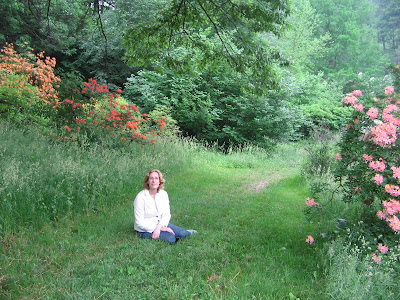Corraggio Amanda, back to writing!
For about the past six weeks, my head and body have been in too many places for me to be able to sit down and focus in this space. But I am determined that this blog not become a time capsule that perfectly preserves March 19, 2007, or one of the millions of abandoned blogs out there, when in fact, there's much to write about.
I should at least finish my Tennessee story, if only for posterity's sake. But lately I've been considering my grad experience, and thinking about the unexpected position I've come to after this journey. I won't reiterate here my anxieties about my singing or career prospects. They're still there, and informing the picture I'm trying to envision of myself now that I'm close to getting my piece of paper. School has been a disappointing failure; school has been a rewarding triumph. I am a better performer than ever; I can't compete. The gains I made musically were worth the costs to me personally; I miss some parts of my old life, including the part about having a lot more money than I do now. During my studies, I received messages that strongly suggest I bag this whole dream and stick with my day job; I've received other messages that give me hope and encouragement, and confirm my ambitions.
But since the beginning of March those negative voices have spoken louder - as they often will - and I find myself coming into the practice room with a sense of dread. I can work through it, remind myself of how beautiful the music is, and how personal it is to me, but too often I'm spending my energy on fighting my demons. I've even started to fall into the pattern I was in towards the end of my life as a horn player: feeling guilty when I'm not practicing, and feeling inadequate when I am. At the same time, I know perfectly well that life is too short for all this whining! In fact, more solemnly, I can't get out of my mind the deaths of two young people I heard about by chance: Scott Parkinson, with whom I played in a quintet with at Chautauqua in 1993, and Giavanna Kersulis, a BU alum who was on her way to stardom. I'm wrestling with the fact that I am jealous of both of their accomplishments, even though they would gladly trade their fates for my humble destiny.....
Reading about them online, I feel as if I'm going through their old clothes.
If I can do something as shallow as turn from mortality to vocality, I'd like to finally write down an experience I had earlier this month that steered the course of my singing a bit.
Jerry Hadley was at BU for a couple of weeks, giving master classes. I was surprised to walk away from those classes brimming with emotions; usually the affairs inspire only some thoughts about vocal technique and quite a bit of boredom. I first heard him work with a girl in one of my classes, who is capable of producing some ethereally beautiful sounds. She also makes some flatly unattractive noise, and like many of us, radiates insecurity and fear when she performs. After she sang her aria he introduced what would be his running theme for all his classes: listen to your own emotions that this music inspires in you, be yourself and communicate them. You no longer need to think or worry about technique.
He had her say the text in English, slowly, and think about a time in her life when she was in the same position as the character she was portraying. Teachers always urge us to inhabit the role by imagining what it might be like to go through what the character is experiencing. But why do that when it's likely that you've felt something just like this character in your own past? After all, opera does have a rather strong human appeal....
He then got her to sing the aria without the "singer's stare," that glassy-eyed, "I'm concentrating" look that is free of emotion, connection, or ease. We all adapt it as we try to zone out and counter nerves. But isn't it more pleasant for performer and listener alike if we forget about technique altogether and let ourselves revel in the emotions that attract us to music in the first place? Her second performance was riveting, leaving her and all of us near tears.
In another class, as he was coaching my handsome scene partner, and he addressed the entire class. I even took some notes, just a few words that strucka nerve:
Every one of you has this gift from God, and you are worthy of that gift. Do you hear me? You are worthy of that gift. And no one can take it away from you, because it's a gift from God. Therefore, you are invincible. There is nothing more that you love doing, because you are most you when you do it. If people tell you negative things about your singing, if they reject you, it's all lies. Your love of singing threatens them, you're doing something and experiencing things tehy wish they could, they are jealous and must protect themselves. If you really want to do this, nothing will stop you. The minute you take no for an answer, you are dead in the water. Your job is to sing as beautifully and as honestly as you can. In old meanings 'perfect' actually meant compassionate.
In another session, each singer was transformed. I couldn't help but watch them and let myself believe the conceit: during their performances, each singer was no longer my rival or friend or colleague. Each became the most beautiful singer in the world, the most beautiful person, and I wanted nothing more than to feel the emotions they felt in their songs, and be close to them and feel their sound resonating on my own face and heart. Afterwards, having brought new depths to their sound and their performances, they floated back to their seats, taking with them a new gift to share with listeners.
I could have sung for one of those classes. There was time once, and I even left the room to warm up. But I lacked the courage to speak up and ask him.



